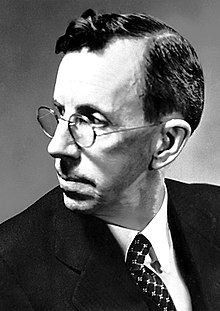Clinton Joseph Davisson
| Clinton Joseph Davisson | |
|---|---|

Davisson
|
|
| Born |
October 22, 1881 Bloomington, Illinois, USA |
| Died | February 1, 1958 (aged 76) Charlottesville, Virginia, USA |
| Nationality | United States |
| Fields | Physics |
| Institutions |
Princeton University Carnegie Institute of Technology Bell Labs |
| Alma mater |
University of Chicago (B.S., 1908) Princeton University (Ph.D, 1911) |
| Doctoral advisor | Owen Richardson |
| Known for | Electron diffraction |
| Influenced | Joseph A. Becker William Shockley |
| Notable awards | (1928) Elliott Cresson Medal (1931) Hughes Medal (1935) Nobel Prize in Physics (1937) |
| Spouse | Charlotte Davisson |
Clinton Joseph Davisson (October 22, 1881 – February 1, 1958), was an American physicist who won the 1937 Nobel Prize in Physics for his discovery of electron diffraction in the famous Davisson-Germer experiment. Davisson shared the Nobel Prize with George Paget Thomson, who independently discovered electron diffraction at about the same time as Davisson.
Davisson was born in Bloomington, Illinois. He graduated from Bloomington High School in 1902, and entered the University of Chicago on scholarship. Upon the recommendation of Robert A. Millikan, in 1905 Davisson was hired by Princeton University as Instructor of Physics. He completed the requirements for his B.S. degree from Chicago in 1908, mainly by working in the summers. While teaching at Princeton, he did doctoral thesis research with Owen Richardson. He received his Ph.D. in physics from Princeton in 1911; in the same year he married Richardson's sister, Charlotte.
Davisson was then appointed as an assistant professor at the Carnegie Institute of Technology. In 1917 he took a leave from the Carnegie Institute to do war-related research with the Engineering Department of the Western Electric Company (later Bell Telephone Laboratories). At the end of the war, Davisson accepted a permanent position at Western Electric after receiving assurances of his freedom there to do basic research. He had found that his teaching responsibilities at the Carnegie Institute largely precluded him from doing research. Davisson remained at Western Electric (and Bell Telephone) until his formal retirement in 1946. He then accepted a research professor appointment at the University of Virginia that continued until his second retirement in 1954.
...
Wikipedia
